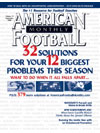AMERICAN FOOTBALL MONTHLY THE #1 RESOURCE FOR FOOTBALL COACHES
Article CategoriesAFM Magazine
|
AFM Subscribers Ask...with David Cutcliffeby: David Cutcliffe© More from this issue After only 22 wins over the last 13 seasons, Duke turned their fortunes to new head coach David Cutcliffe last December. Coach Cutcliffe comes to Durham after serving the previous two seasons as assistant head coach and offensive coordinator at Tennessee. His coaching experience includes a six-year stint at Ole Miss where the Rebels had a 44-29 record and went to four bowl games. Cutcliffe was named the SEC Coach of the Year in 2003 after leading the Rebels to a 10-3 record. He has participated in 22 bowl games over his coaching career and has tutored both Manning brothers: Peyton while OC at Tennessee and Eli while head coach at Ole Miss. He answers your questions… After you arrived at Duke, were there specific areas within the overall football program that you felt needed immediate attention? Aside from building a new ....The full article can only be seen by subscribers. Subscribe today!
|
|
|||||||
| HOME |
MAGAZINE |
SUBSCRIBE | ONLINE COLUMNISTS | COACHING VIDEOS |
Copyright 2026, AmericanFootballMonthly.com
All Rights Reserved





